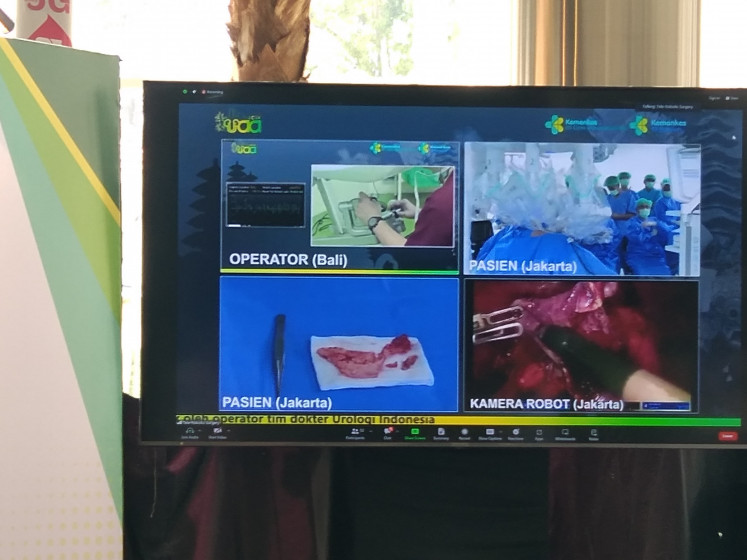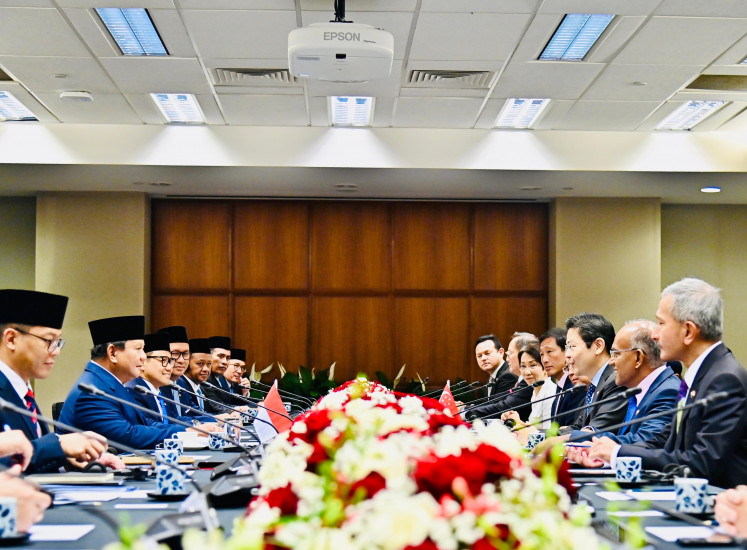Popular Reads
Top Results
Can't find what you're looking for?
View all search resultsPopular Reads
Top Results
Can't find what you're looking for?
View all search resultsBanks need to adopt digital technology to widen market
Indonesian banks should focus on investing in digital technology to tap into a wider market, even though they may not see immediate results and must remain cautious of cyberthreats, consulting firm PricewaterhouseCoopers (PwC) has suggested
Change text size
Gift Premium Articles
to Anyone

I
ndonesian banks should focus on investing in digital technology to tap into a wider market, even though they may not see immediate results and must remain cautious of cyberthreats, consulting firm PricewaterhouseCoopers (PwC) has suggested.
Several banks have, in fact, recognized the importance of digital technology, but they find themselves at a crossroads, as they also realize that the revenue contribution of digital services is still at a very nascent stage.
A survey released by PwC on Tuesday reveals that 40 percent of the respondents generate less than 5 percent of their revenue from digital services. Meanwhile, 40 percent of the respondents stated they were not currently measuring this.
The survey collected responses from 43 of 114 banks in Indonesia, consisting of views from a total of 52 respondents, including CEOs and other top-level managers from banks in the Buku I, II, III and IV categories as well as foreign banks.
“If banks do not expand their [use of] digital technology, they will lose their markets, especially the millennials segment. Thus, although the investment they make has yet to increase profitability, it will help banks reduce losses,” Rimko Nurral, PwC consulting technology director, said on Tuesday.
One of the leading players that is putting huge investment into technology is Bank Tabungan Pensiunan Nasional (BTPN), which has been penetrating the market through its digital mobile banking app called Jenius.
BTPN digital banking head Peterjan Van Nieuwenhuizen said that, in order to move fast and grab a larger market share in a country with a big population like Indonesia, banks have to be consumer-centric, not only
product-centric.
“Digital is not just a channel, but it is part of the product. […] The moment you recognize that digital is part of your product, you need to have internal digital capabilities,” he said.
He added that the traditional banking industry still saw the digital services department as some kind of additional unit to the core banking unit to deliver their products, instead of incorporating digital technology in those products.
BTPN claims to have attracted 685,000 people to its Jenius digital banking platform, up from 457,000 users at the end of 2017.
In addition to the importance to invest in digital technology, the PwC survey also highlighted that banks consider cybersecurity threats the biggest risks to their digital business over the next two to three years.
To cope with this challenge, the consulting firm addressed the need of banks to have their own CISO (chief information security officer) to help protect crucial data.
According to the company’s survey, 69 percent of respondents currently do not have a CISO yet, as they are trying to manage cybersecurity risks through their risk and compliance teams.
“In one case, [the bank] believes it does not have proper security, but it is comfortable enough with the current risk and compliance team to handle digital and cybersecurity threats,” Chairil Tarunajaya, PwC technology and risk consulting leader, said in Jakarta.
Pudja Unggul Kartiman, vice chairman of the Indonesian Cyber Security Forum (ICSF), was of the opinion that cybersecurity was a real and complex threat that could negatively impact the banking industry as well as customers.
“[Banks] should know that their information is a valuable asset, then build shields surrounding their assets. If they do not know which assets they need to protect, then they can’t create the infrastructure,” he said.









